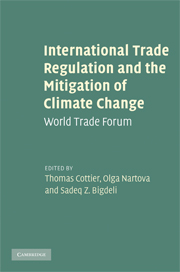Book contents
- Frontmatter
- Contents
- Contributors
- List of figures
- List of tables
- List of abbreviations
- Preface
- PART I Climate change mitigation: scientific, political and international and trade law perspectives
- PART II Climate change mitigation and trade in goods
- PART III Trade in renewable energy sources
- PART IV Climate change mitigation and trade in services
- 11 GATS, financial services and trade in renewable energy certificates (RECs) — just another market-based solution to cope with the tragedy of the commons?
- 12 Assessment of GATS' impact on climate change mitigation
- 13 GATS' commitments on environmental services: ‘hover through the fog and filthy air’?
- PART V Climate change and technology transfer, investment and government procurement: legal issues
- PART VI Institutional challenges and the way forward
- Index
- References
12 - Assessment of GATS' impact on climate change mitigation
from PART IV - Climate change mitigation and trade in services
Published online by Cambridge University Press: 04 August 2010
- Frontmatter
- Contents
- Contributors
- List of figures
- List of tables
- List of abbreviations
- Preface
- PART I Climate change mitigation: scientific, political and international and trade law perspectives
- PART II Climate change mitigation and trade in goods
- PART III Trade in renewable energy sources
- PART IV Climate change mitigation and trade in services
- 11 GATS, financial services and trade in renewable energy certificates (RECs) — just another market-based solution to cope with the tragedy of the commons?
- 12 Assessment of GATS' impact on climate change mitigation
- 13 GATS' commitments on environmental services: ‘hover through the fog and filthy air’?
- PART V Climate change and technology transfer, investment and government procurement: legal issues
- PART VI Institutional challenges and the way forward
- Index
- References
Summary
Setting the scene
According to the United Nations Framework Convention on Climate Change (UNFCCC), the principal reason for the earth's rising temperatures is a century and a half of industrialisation: the burning of ever-greater quantities of oil, gasoline and coal, the cutting down of forests, and the practice of certain farming methods. The current dependency of the global economy on fossil fuels and the rapid increase in fuel consumption are influenced by international trade.
Trade and climate change policies are currently managed under separate legal regimes, although the international trade system offers various mechanisms for promoting environment-friendly development and contributing to climate change mitigation. In particular, liberalisation of trade in environmental goods and services (EGS) can help to achieve climate change objectives through reducing the cost of access to EGS, promoting environmentally preferable products and services, and creating incentives for technology transfer.
The Doha ministerial declaration provides a distinct mandate for negotiations on environmental goods and services and calls for ‘the reduction or, as appropriate, elimination of tariff and non-tariff barriers to environmental goods and services’. There are two important questions linking climate change and trade which come up in relation to the implementation of paragraph 31(iii):
What are environmental goods and services?
What might be a pattern for liberalisation which would not only have an influence on climate change but would also suit both developed, export-oriented countries and developing WTO Members?
- Type
- Chapter
- Information
- International Trade Regulation and the Mitigation of Climate ChangeWorld Trade Forum, pp. 259 - 273Publisher: Cambridge University PressPrint publication year: 2009



